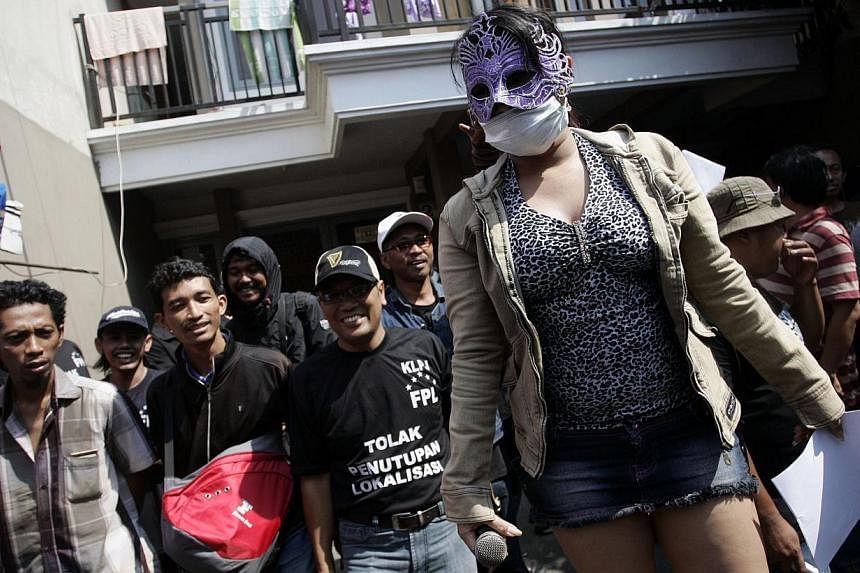SURABAYA, Indonesia (AFP) - Sex workers in skin-tight outfits sit in shop windows, ignoring the call to prayer that blares from mosques across the heart of one of Southeast Asia's biggest red-light districts.
The series of narrow alleys in Surabaya's "Dolly" district on Indonesia's Java island teem with prostitutes touting for business, smiling through the windows and doorways of dingy clubs and bars housed in crumbling buildings.
While foreign tourists may first think of places such as Thailand when it comes to South-east Asian red-light destinations, one of the largest has been challenging assumptions in the world's most populous Muslim-majority country for decades, largely undisturbed by authorities.
But now a crusading mayor - credited with regenerating Surabaya, Indonesia's second-biggest city after the capital Jakarta - is making a determined push to close down the notorious brothel network despite fierce resistance and warnings that it could push sex workers into destitution.
"We have to lift our people from oppression," said Ms Tri Rismaharini, a female mayor who wears the Muslim headscarf and whose stewardship of Surabaya has led many to predict she could have a future role in national politics.
While the city says the plan is its own, Islamic leaders are also claiming credit after pressuring authorities for years over Dolly, which is thought to take its name from a Dutch madam who ran a brothel in the city during the Netherlands's colonial rule of Indonesia.
Now Ms Rismaharini has set a date of June 18 to close the brothels in Dolly and a neighbouring area called Jarak, which have a largely local clientele.
Authorities are offering each of the estimated 1,400 prostitutes around five million rupiah (S$528) and training in new professions that are expected to replace prostitution there, such as baking or handicrafts.
While many have welcomed the move, the plan has stirred strong opposition from sex workers and others whose jobs depend on Dolly, such as taxi drivers and street vendors who contribute to the area's estimated nightly income of between 300 and 500 million rupiah.
' I REALLY NEED THIS WORK'
Sex workers and residents have been staging protests in recent weeks, with hundreds of prostitutes marching through Dolly earlier this month.
"I am not going to accept the government offer because I really need this work," said Ms Mawar, who gave only one name, sitting on a faded old sofa in a club in Dolly.
"I would never be able to find another job because I did not even finish elementary school."
The sex worker, who earns between 10 million and 13 million rupiah a month, said it would be hard for her to support her two children, aged five and eight, if Dolly closes.
On a recent evening, there were crowds of people and hordes of cars and motorbikes thronging the streets, including many prostitutes and pimps. There were also couples out for a stroll and children playing, and the atmosphere was peaceful.
The area appeared to be operating normally in recent days, apart from regular protests during the day time, an AFP reporter said.
According to local reports, the mayor will issue a declaration on Wednesday evening, saying that Dolly and Jarak are closed and police will move in to shut it down.
The prostitutes will have to leave the same day and will receive training for the next seven days, according to officials. Those who came from villages outside Surabaya will have to return to them.
For some members of the public, this will be a welcome move.
"I want Dolly to be closed - this place brings shame on Surabaya," said Ms Siti, a 46-year-old teacher who like many Indonesians goes by one name.
"The people who go there for girls are sexually unstable."
FIGHTING BACK
But Ms Lilik Sulistyowati, from NGO Yayasan Abdi Asih which works with prostitutes in the area, warned that the workers were unlikely to go quietly.
"They will fight the closure," she said, and blamed the government for trying to push through the plan in such a short time, saying authorities should have aimed to shut it within five years after retraining the sex workers.
Despite concerns in some quarters, for local Muslim leaders the closure will be a huge victory after years of campaigning.
"The closure of Dolly must be highly praised," said Mr Abdusshomad Buchori, local head of the country's top Muslim clerical body, the Indonesia Ulema Council.
"As the world's most populous Muslim country, it is not too much to demand that Dolly be closed. What they are doing is not a job. Selling one's body is immoral and inhuman behaviour."

